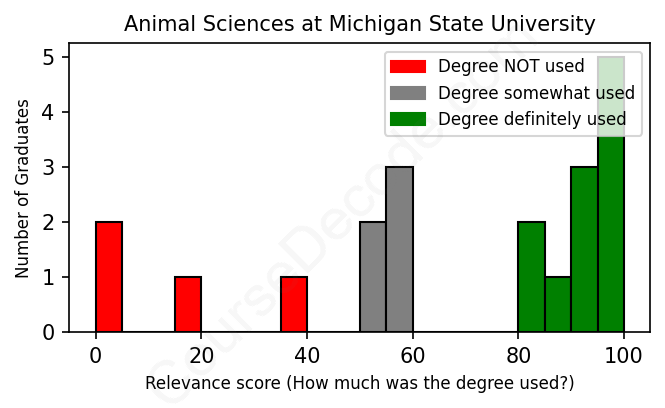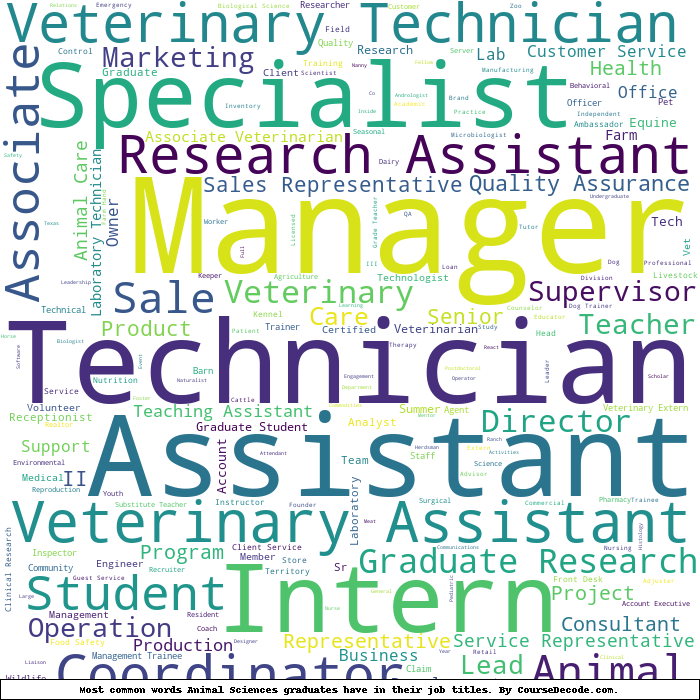
First, some facts. Of the Animal Sciences graduates from Michigan State University we've analyzed , here's how many have used (or NOT used) their degree in their career:

These are estimates based on AI analysis of 20 LinkedIn profiles (see below).
The verdict? On par with the average. Overall, with an average relevance score of 67%, Animal Sciences graduates from Michigan State University have about the same likelihood of finding work in this field as the average graduate across all fields:
And for comparison, here's the chart for all profiles we've looked at across all degrees.
Also, after graduating, only 30% of these graduates have pursued further education other than another Bachelor's degree (such as a Masters degree or other), compared to the average across all profiles of 35%. This suggests a Bachelors degree is enough for most Animal Sciences graduates, and it's normal to look for work straight after graduation.
See the details:
|
Relevance score: 88% We think this person has gone into a career highly relevant to their degree. We think this person has gone into a career highly relevant to their degree.
DEGREE INFOGraduated in 2010 from Michigan State University with a Bachelor of Science - BS in Animal Sciences. Also pursued further education since (see below). JOB HISTORY SINCE GRADUATIONActivities Director Silver Lake Jellystone Camp-Resort May 2010 - Aug 2012 Customer Service Representative  Fifth Third Bank Dec 2010 - Aug 2012 Assistant Manager  The Lodge for Pampered Pets Jul 2016 - Jun 2017 Customer Service Representative  Wilson Veterinary Hospital Aug 2012 - May 2015 Licensed Veterinary Technician  Wilson Veterinary Hospital May 2015 - Nov 2018 Breeding Specialist  Elite Detection K9 Sep 2018 - Jul 2020 Licensed Veterinary Technician  Clarkston Animal Medical Center Aug 2020 - Jul 2021 Reproduction Coordinator  Wilson Veterinary Hospital Jul 2021 - Present Licensed Veterinary Technician  Leader Dogs for the Blind Apr 2018 - Jul 2019 Breeding Specialist  Leader Dogs for the Blind Sep 2017 - Present FURTHER DEGREES DONE SINCE GRADUATINGAssociate of Applied ScienceMacomb Community College 2013 - 2015 ABOUTNo information provided. |
The top 10 most common jobs done by the graduates we've analyzed (ranked most common to least) are:
The graduates from the Animal Sciences program at Michigan State University have pursued a wide range of careers, with many gravitating toward roles that require direct knowledge of animal care and management. Job titles like Licensed Veterinary Technician, Breeding Specialist, and Veterinary Assistant frequently appear, highlighting a solid connection to their degree. These positions typically demand an understanding of animal behavior, health, and handling, which are core components of their education. Other roles, such as Compliance Officer or Research Assistant, also show relevance, as they involve applying scientific principles and regulatory knowledge related to animal sciences.
However, not all positions align closely with the specialized training that comes with an Animal Sciences degree. Some graduates have taken on roles in customer service, sales, and management that don’t leverage their academic background in a meaningful way. For instance, jobs like District Training Manager or Inside Sales Representative may not involve direct animal care or an application of advanced animal science knowledge. Overall, while many graduates are successfully using their degrees in relevant fields, a significant portion has ended up in roles that don't make the most of their education, suggesting a mixed outcome in terms of job relevance and application of animal sciences knowledge.
Here is a visual representation of the most common words in job titles for Animal Sciences graduates (this is across all Animal Sciences graduates we've analyzed, not just those who went to Michigan State University):

Graduates from the Animal Sciences program at Michigan State University seem to have generally diverse career trajectories that often start in hands-on animal care or related services. For many of these graduates, their first jobs after graduation typically involve roles like veterinary technicians, animal research assistants, or positions in customer service at veterinary hospitals or related organizations. This is especially true for those graduating around 2010 to 2012, where roles as licensed veterinary technicians or assistants were common stepping stones into the field. Even with a few shifts into customer service or management roles, many graduates stayed within the animal care and veterinary services industry, indicating that their early jobs were relevant to their degrees.
As we look roughly five to ten years down the line, a good number of these professionals have managed to climb the ladder within the animal sciences field. Graduates have taken on roles such as practice managers, compliance officers, and even research veterinary medical officers, showcasing a career progression into more specialized or managerial positions. However, there are also instances of graduates veering off the animal sciences track entirely, with some entering sales or operations management, which could indicate a broader interpretation of their degree or a shift in career interests over the years. Overall, it seems that while many alumni find fulfilling paths directly related to Animal Sciences, some choose to explore opportunities outside of that specific realm, leading to a mix of outcomes in their careers.
Hey there! So, getting a Bachelor’s degree in Animal Sciences at Michigan State University—or really anywhere—can be a bit of a mixed bag. It's not the easiest degree out there, but it’s not the toughest either. You'll dive into some cool topics like animal health, genetics, and nutrition, but be prepared for some heavy-duty science classes, like biology and chemistry, which can be challenging if those aren't your strong suit. MSU has a good program with hands-on experience, which helps make things a bit more interesting, but expect to put in some solid work. If you keep up with the readings and stay organized, you’ll likely find it doable, but it might require more effort than some other majors. Just stay curious and passionate about animals, and you’ll be just fine!
Most commonly, in the LinkedIn profiles we've looked at, it takes people 4 years to finish a Bachelor degree in Animal Sciences.
Looking at the career paths of these Animal Sciences graduates from Michigan State University, it seems like they’ve done alright when it comes to making money, but it really varies. Some have climbed the ladder pretty steadily, like the grad who became a veterinarian and now owns a clinic, which likely earns decent income. On the flip side, there are those who have stuck with support roles or entry-level positions for a while, which typically don’t pay as much, such as the kennel assistants and customer service reps. Position matters a lot here too—those in management or specialized technical roles tend to have better salaries. So, while some are definitely raking it in, others might still be working their way up or in jobs that don't quite pay the big bucks. Overall, there’s a mix of success, but it looks like there’s potential for decent earnings if they keep advancing in their careers!
Here is a visual representation of the most common words seen in the "about" section of LinkedIn profiles who have a Bachelor degree in Animal Sciences (this is across all Animal Sciences graduates we've analyzed, not just those who went to Michigan State University). This may or may not be useful:

Here are all colleges offering a Bachelor degree in Animal Sciences (ordered by the average relevance score of their Animal Sciences graduates, best to worst) where we have analyzed at least 10 of their graduates:
| College | Score | Count |
|---|---|---|
 Purdue University Purdue University
|
80 | 14 |
 California State Polytechnic University-Pomona California State Polytechnic University-Pomona
|
78 | 13 |
 North Carolina State University North Carolina State University
|
77 | 18 |
 Iowa State University Iowa State University
|
75 | 25 |
 University of Missouri-Columbia University of Missouri-Columbia
|
75 | 12 |
 South Dakota State University South Dakota State University
|
73 | 10 |
 The Ohio State University The Ohio State University
|
71 | 21 |
 University of Florida University of Florida
|
68 | 15 |
 University of Vermont University of Vermont
|
68 | 12 |
 Michigan State University Michigan State University
|
67 | 20 |
 University of California, Davis University of California, Davis
|
66 | 27 |
 University of Illinois at Urbana-Champaign University of Illinois at Urbana-Champaign
|
63 | 16 |
 University of Tennessee, Knoxville University of Tennessee, Knoxville
|
61 | 13 |
 University of Arkansas University of Arkansas
|
60 | 10 |
 California Polytechnic State University-San Luis Obispo California Polytechnic State University-San Luis Obispo
|
59 | 22 |
 University of Wisconsin-River Falls University of Wisconsin-River Falls
|
58 | 10 |
 Texas A&M University Texas A&M University
|
54 | 34 |
 Penn State University Penn State University
|
53 | 14 |
 Texas Tech University Texas Tech University
|
51 | 12 |
 Kansas State University Kansas State University
|
51 | 22 |
 Oklahoma State University Oklahoma State University
|
43 | 16 |